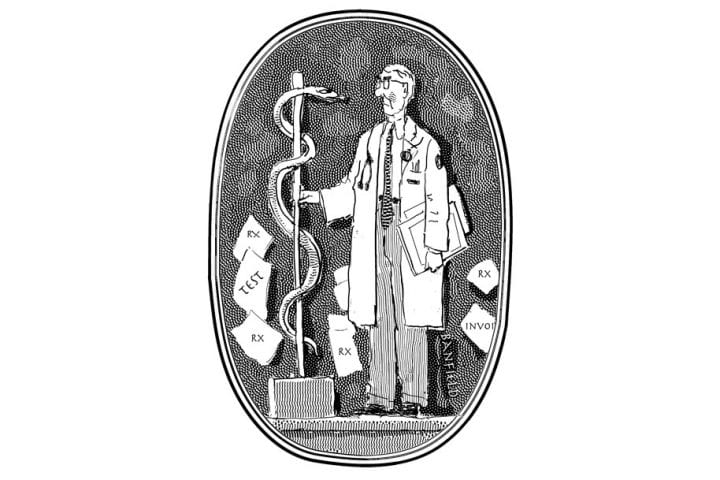At press time the impeachment process grinds on in the Senate, with about as much chance of convicting Donald Trump as of getting John Bolton to shave his moustache. A man who follows TV ratings very carefully, the president must be keen to discover which will be more pathetic, coverage of the Democratic presidential debates or of the Democratic impeachment proceedings in the House and Senate. In either case the more painful and protracted the show, the fewer the viewers.
Like everyone else, especially the Democrats, Trump and his team are already looking beyond the Senate trial to the elections, only nine months away. As they see it, the case for their candidate has three main elements—the man, the economy, and the alternative.
How the impeachment ordeal will affect the voters’ view of Trump himself is anyone’s guess. It didn’t help Richard Nixon’s numbers; he quit before the House had even passed a formal bill of impeachment. Bill Clinton’s popularity was greater after impeachment than before—but that didn’t buoy his would-be successor Vice President Al Gore, who lost in 2000 (after a constitutional kerfuffle) to George W. Bush, who claimed to be restoring unimpeachable honor to the presidency.
Among Trump’s fervent supporters the impeachment will be further evidence of his persecution by a corrupt establishment, for which they will love him all the more. But there are too few of them to re-elect him in a two-person race. He needs millions more who aren’t so persuaded of his virtues, and for whom the impeachment proceedings, even with an acquittal, could reinforce doubts about his character and competence.
After all, the media derided Trump for claiming his telephone call with Ukraine’s President Zelensky was “perfect,” though they haven’t derided the Democrats for claiming the call was perfect in a contrary way—perfectly corrupt or self-serving. Yet this was the House managers’ theory of the crime—or non-crime, whichever the exigencies of their argument dictated. To their minds, the call was the offspring of an obviously vicious desire to keep Joe Biden out of and Trump in the White House for the next four years. Their motto: millions of dollars and two years for an investigation of illusory Russian collusion, but not one cent or one day for an investigation of Ukraine!
But in arguing ad hominem, the Democrats have left themselves with a fateful choice to make in the upcoming election. If their beef is that Trump’s character is abnormal or unstable, then they will want to prescribe a presidential candidate who is normal, calm, reassuring. If, however, they blame Trump’s “authoritarian personality” on right-wingers’ inherent racism, sexism, and capitalism, then they will require not a normal but a radical candidate, eager to challenge the immoral status quo. Biden or Bernie?
* * *
So long as Trump’s base admires (or mostly admires) him, he’s willing to bid for the marginal voters he needs on the basis of what he’s done for them lately. Impeachment doesn’t help him with these voters, but he’s betting it won’t hurt him very much, either, because it hasn’t hurt them. The economy has shrugged it off. Trump will point to his overall record in office but especially the economy, and not merely to the booming stock market but to higher wages for the lower middle class and record-low unemployment for all. This is the kind of success otherwise skeptical voters might actually attribute to a businessman like him. That’s risky, because prosperity can be here today and gone tomorrow; but that’s politics.
His insurance policy against bad economic times before Election Day is—the Democratic presidential candidates themselves. Whether it’s Biden, Bernie, or one of the others, the alternative to Trump will not exactly be a Pericles. Four years ago, Trump defeated Jeb Bush and Hillary Clinton, emissaries of the two most powerful political families in America, whose political accomplishments looked much more formidable, on the surface at least, than anything Biden or Bernie has ever done in politics. Why shouldn’t he be rubbing his hands in anticipation of opposing either the somnambulist or the socialist?
Even with his acquittal, the roaring economy, and a lame opponent, impeachment remains a potential electoral stumbling block. Trump needs something positive to take out of the experience, a fourth reason to re-elect him. Oddly enough he may have found it in his attorneys’ arguments to the Senate portraying him variously as: the tribune who refused to let the people’s choice be driven from office; the defender of the constitutional presidency against a vicious, factious majority in the House; and the restorer of moderation and equilibrium to a political system badly deranged by a half century of partisan excess and bureaucratic engorgement. Prepare to meet Donald Trump, defender of democracy.






